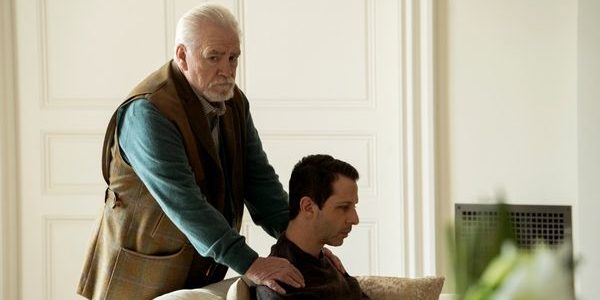SUCCESSION Season 2: A Gripping, If Somewhat Funny, Shakespearean Power Drama

Reyzando Nawara is a passionate film and TV enthusiast from…
When it first aired last year, Succession dared us to care about a group of despicable people who scheme and backstab their way into the top of a throne owned by a terrifying self-made patriarch Logan Roy (perfectly played by Brian Cox). While this request is not entirely new and fresh in TV anymore (see: Breaking Bad, The Sopranos, Mad Men), Succession immediately found a way to be something much greater and more profound by finding nuance and a crack of sympathy in the characters’ unpleasantness and entitlement — all thanks to Jesse Armstrong’s excellent writing and universally compelling performances from the ensemble.
Make no mistake, though, the show is still pretty much very caustic, and the central family told in the story is still trying to shoulder each other aside in order to gain an absolute power of being the CEO of the family’s company Waystar Royco. But in doing so, not only does Armstrong manage to grab our sympathy, he also succeeds at deepening the characters and their intimacy, allowing them to get fleshed fully as real people with real emotions without even trying to heavy-handedly provide lengthy expositions of their past. And as a result, what could’ve been another story about hateful, rich, white people trying to do bad things just because they’re able to do so, had it been handled by a lesser showrunner, ends up becoming a timely and complex show about the impact that power, money, and trauma can have on human nature.
Kendall Roy, the Newest TV Sad Boi
The first episode of the second season, “The Summer Palace”, picks up where season one left off, where the number one boy Kendall Roy, an ambitious, sad sack who’s trying to blindside his father by making a deal with his arch nemesis but failed miserably after getting involved in a tragic car accident that killed a young waiter in her sister Shiv’s (the ferocious Sarah Snook) wedding night, is beaten down than ever out of guilt and trauma that he still feels deeply after the accident.
But when your family is running a huge business that begins to crumble because of the bomb you planted yourself — Kendall publicly announced that he wants to dethrone his father in season one finale — there’s really no time for introspection, let alone guilt. There can only be time for business, business, and business. So even though Kendall is still pretty much drowning from the aftermath of his own mistakes, he is forced to clean up his own mess immediately.

Not only that Kendall’s tragic fate in season one becomes a humiliation that he has to endure aside from the trauma, he basically also has to give up his whole life for Logan after he offered him to cover up his involvement in the car accident, a debt that he can only pay by being Logan’s puppet. This slow burn self-annihilation is what defines Kendall’s arc throughout season two, how dangerous and futile it is to cross Logan.
And Jeremy Strong, a talented actor who plays Kendall, is able to conjure such profound psychological and emotional pains in ways that it allows us to understand his inner thoughts and trauma even when he displays it in a very subtle manner. His viscerally heartbreaking performance this season will (hopefully) not only get him an Emmy nomination next year, but will, in fact, also go down as one of the best TV male performances in the last decade.
Through Kendall’s journey into coming to terms with his own trauma and guilt, both Jesse Armstrong and Jeremy Strong have successfully made a male TV characters with rare emotional range that walks between tenacity and despair. He is a character that is easy to root for, no matter how messed up he might be. And no, it’s not because the story of the show is basically told from his perspective or because Strong’s performance is so compelling, but more because of how his morality, vulnerability, and humanity allow him to really feel all of the emotions he’s having without any ability to turn it off.
The way he carries the emotions beneath his cunning presence — from his body language to his facial expressions — allows us to understand the inner thoughts and profound emotions that he has and eventually also leads us to easily sympathise with him.
The Shared Trauma That Impacts The Roy Children
Above all else, the show’s exploration on Kendall’s pain also provides an insightful sneak peek into the shared trauma that the Roy children have to endure while growing up under toxic circumstances created by their unloving father Logan. In the seventh episode “Return”, where Kendall and his siblings Roman (Kieran Culkin) and Shiv visit their mother Lady Caroline, we see him trying to admit his crime and guilt to his mother, hoping that it would help him find a glimpse of sympathy and relief he clearly never gets from Logan. Unfortunately, his mother chooses to shut him down, probably because she doesn’t want to have a form of motherly attachment that Kendall and his siblings so desperately need. In this exact moment, you can’t help but think that all this time it’s not just Logan’s fault that the Roy children misbehave that way, but also because their emotionally unavailable mother doesn’t seem to want anything with them, not even a conversation.

This tragic truth ultimately emphasises the idea of how a lack of family’s love and support will have such a serious impact toward children. In the case of Succession, the Roy children try to take his father’s throne not because they think the company will be better off with them being the CEO, but rather because it gives them an opportunity to get a validation from his father, to show him that they’re able to be like him, to be his successor. The reason is because all their life, the Roy Children don’t really understand what real love is. They mistake love with validation, a false form of love that they try to earn from their father. And as a result, their race on getting this validation lead them to eat each other alive, instead of trying to work together as one family unit.
Even worse, it also ramifies into their personal life. For Roman, it is his incapability to have a genuine and intimate relationship with other people. Meanwhile for Shiv, it’s her over ambition to be the most superior person in the room that leads her to always push aside those who threatens her existence, even if it means that she has to marry a lower-class man for the sake of maintaining her superiority. Succession makes a compelling case on how shared trauma of not having enough parental love can operate toxically to the victim’s life, how childhood pain and parental abuses can manifest into myriad of dire ramifications that rots the very core of what makes us human.
Can the Women of Successor Finally Break Through?
Whereas the show’s exploration on the impact of trauma and family dynamic remains fascinating and heartbreaking throughout, what really makes Succession even more excellent is how in the intersection of politics, media, finance, and a world filled by alpha male, the season manages to find plenty of ways to let the female characters have their own authority, in particular Shioban “Shiv” Roy, the only daughter of the Roy clan who’s promised the CEO position by her father.
It’s clear that her whole life, Shiv used to get pushed aside because she’s a woman, the only female figure in a family full of lion. So as a form of rebellion, at first, Shiv decides to seek validation from Logan by creating her own track, building a meritocratic career by working for a politician whose ideology stands against everything that Logan and his company do. At least not until the minute Logan offers her the CEO position that Shiv finally stops all of her rebellion acts because she assumes that she finally gets the regard and approval she’s been looking for from her father her whole life. Through this trajectory, Shiv is given an opportunity to show what she’s really made of. And she really does everything to make sure that Logan sees her as the only child who’s capable to be his successor, even if it means that she has to sacrifice a big part of her that makes her empathetic and embrace her father’s toxic principle.

The problem here, though, it seems like Logan is never really that serious on giving all of his power to Shiv. In fact, throughout the first half of season two, Shiv is constantly being kept out of the loop by Logan where Kendall and Roman aren’t. So when she realises that the spotlight she’s given by Logan isn’t even turned on, she begins to make every move out of her own desperation to sway the needle her way again, instead of weighing it smartly and logically. The pinnacle of Shiv’s hopelessness is displayed in episode five “Tern Haven”, where she blurts out that Logan has chosen her to be his successor at a dinner occasion meant for another agenda, assuming that it will force her father to finally fulfill his promise to her.
Watching Shiv, who usually appears to be the most level-headed person in the family, slips and does something so unwise is so cringey and uncomfortable that I had to cover my eyes with a pillow when the whole scene unfolds. Yet, in the talented hand of Jesse Armstrong this moment is somehow subverted into a greater observation on how when a person, especially a minority, is suddenly under a microscope — a precarious position that Shiv’s in — you can find yourself conducting things that are irrational and simpleminded. Yes, it’s easy to reduce Shiv’s act as foolish, but the real argument that Succession clearly lays out here is how delicate it is the relationship between women and power, how should women express their power in a way that isn’t gonna put them on a fragile position which could backfire?
Succession Season 2 Is the Best TV Drama of the Year
All of the show’s questions about power and exploration of family dynamic and trauma may seem too much and very complex for a TV series known by the whole Twitter for its absurdity. And while it is indeed a lot to take in, part of what makes Succession so engaging and accessible, however, is how, even with all of that dark storylines and the characters’ unpleasantness, it always finds a way to deliver all of it in a darkly comedic manner that makes the whole experience of the season much more delicious.
To put it simply, season two does not just succeeds at expanding the strong foundation that the first season has built meticulously, it also keeps escalating the stakes and tensions as well as the hilarity. And in doing so, Succession has solidified itself as the best TV drama of the year.
So what do you think of the season two finale? Do you see the “twist” coming? Let us know in the comments below!
Both seasons of Succession are now available to stream in HBO Go and HBO Now.
Does content like this matter to you?
Become a Member and support film journalism. Unlock access to all of Film Inquiry`s great articles. Join a community of like-minded readers who are passionate about cinema - get access to our private members Network, give back to independent filmmakers, and more.
Reyzando Nawara is a passionate film and TV enthusiast from Indonesia. When he's not watching TV and movies, he likes to cook and make sorbet.













